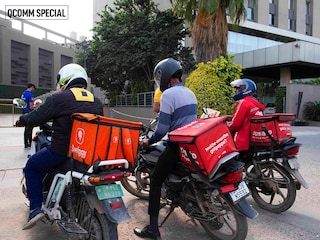Zomato: No quick returns amid steep competition
Shares of Zomato have been on a bumpy ride, losing nearly 30 percent in the last three months


Shares of Zomato have slumped nearly 30 percent from the record highs touched on December 5, 2024, (at ₹304.5). The overall market sentiment has been weak in the last few months and, therefore, most stocks are under pressure. However, the issue of such heavy sell-off in Zomato’s and rival Swiggy’s shares is sector-specific.
Steep competition in the food quick commerce businesses and massive cash burns by Zomato and Swiggy are worrisome. Some analysts even call the sharp discounts offered by Zomato and Swiggy ‘irrational’. In the last few months, competition in the space has heated up with newbie Zepto offering higher discounts with an aim to increase market share following aggressive store expansions.
The consequence on Zomato shares? Investors quickly dumped the stock. So far, this year, the stock has lost 22 percent starting January. However, it has been rewarding for those who bought its shares during its initial public offering in July 2021. At current rate, Zomato’s shares have surged 185 percent from its issue price of ₹76 apiece.
Abhisek Banerjee, analyst at ICICI Securities, however, thinks that concerns of high cash burns have been over-baked into the stock prices for both Swiggy and Zomato. “We think Swiggy (consolidated) is now trading at 30 percent discount to par value for the food delivery business, implying negative value for the optionality of success in quick commerce. Zomato, on the other hand, is trading at a value that ascribes nothing to quick commerce. We think this anomaly is unlikely to sustain long, especially given a robust outlook for discretionary consumption from May," he says.
Investors have deeply discounted quick commerce valuations citing increasing competitive intensity and high cash burns in the space.
Banerjee feels that food delivery is being ignored by investors in the panic over quick commerce. Food delivery has continued to scale profitably over the last two years and while there was some slowdown in growth in the third quarter of FY25 (October-December), Banerjee says there is reason to be worried about structural growth drivers in the space.
Swiggy’s shares are down around 33 percent this year so far.
Its shares almost halved in just a year, falling to its lowest level at ₹40.55 apiece on July 27, 2022. Lack of profitability made it difficult for Zomato to attract public markets investors. For Zomato investors, 2022 was the most tumultuous year as its shares almost halved, sharply losing from its issue price. Shares of Zomato lost 57 percent in that year. The tide turned gradually as Zomato reported its first-ever quarterly profit in FY24’s first quarter (April-June).
Analysts at Macquarie consider Zomato as an efficient quick commerce and food delivery platform, but for its shares, they see limited margin of safety.
First Published: Mar 18, 2025, 14:27
Subscribe Now